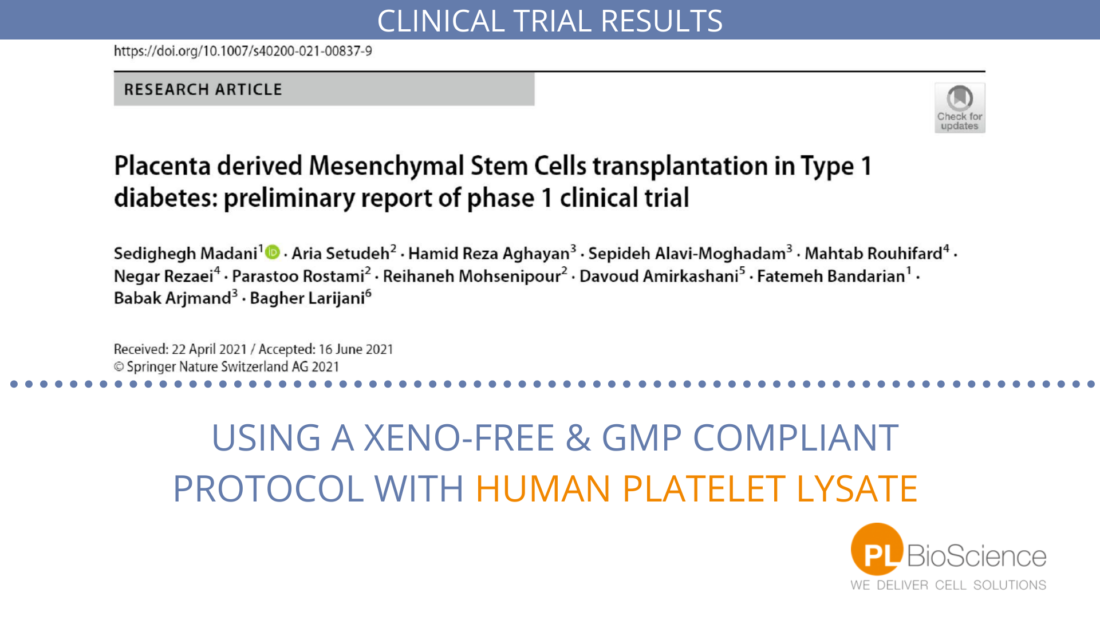
PLMSCs transplantation in Type 1 diabetes patients
Preliminary report phase 1 clinical trial using a xeno-free & GMP compliant protocol with Human Platelet Lysate
Madani et al. reported the short term safety of Placenta derived Mesenchymal Stem Cells (PLMSCs) transplanted in 4 children (Type 1 Diabetes Mellitus patients (T1DM)).
The manufacturing of PLMSCs to the 5th subculture was done with DMEM and 5% of our ELAREM™ Human Platelet Lysate before cryopreservation. The aim was to manufacture an abundant amount of allogeneic PLMSCs with a xeno-free and GMP compliant protocol. (1)
“Clinical grade PLMSCs were successfully manufactured from two placentas using a Xeno-free/GMP compliant protocol.”(1)
It was the first approach of transplanting placenta derived MSCs (PLMSCs) in children with Type 1 Diabetes Mellitus.
Diabetes: One of the leading causes for kidney failure, lower limb amputations and blindness
Diabetes Mellitus is a chronic disease that affects the metabolism. Based on insulin resistance or deficiency, it is one of the leading causes of kidney failure, lower limb amputations, reduced blood flow, neuropathy (nerve damage) and Diabetic retinopathy.
The numbers for adults diagnosed with diabetes are increasing but more devastating are the increasing numbers for children and teens. Therefore, a lot of research is done in the field of regenerative medicine to better understand and treat the disease. (2,3)
Transplantation of PLMSCs into 4 patients from paediatric endocrinology ward
The intravenous injection of PLMSCs into 4 children with type 1 diabetes was monitored for one year. During this period of time, there were no adverse events seen.
“Serious adverse events including anaphylactic shock or hypersensitivity reactions were not seen during intravenous administration of PLMSCs.”(1)
“During 12 months follow-up no adverse effect was observed in these patients.”(1)
Xeno-free & GMP compliant protocol with Human Platelet Lysate
The manufacturing of PLMSCs was done with DMEM and 5% of ELAREM™ Human Platelet Lysate to the 5th subculture before cryopreservation. The process of a GMP compliant protocol has been established before by Kouroupis et al. After manufacturing the PLMSCs were cryopreserved.
“Clinical grade PLMSCs were successfully manufactured from two placentas using a Xeno-free/GMP compliant protocol.”(1)
The “Post thaw viability of PLMSCs was more than 85% […]” (1)
Transplantation of MSCs in patients with Type 1 Diabetes is safe
The preliminary report and the unpublished results of the study showed that MSC transplantation for diabetic patients with Type 1 Diabetes is safe. Moreover, there seems to be a 42% effectiveness because partial remission was observed in two patients. (1)
Advantages of stem cell therapies for diabetes
Stem cell treatment is a novel approach to eliminate beta cell damage and promote their regeneration. The stem cell approaches using MSCs have been demonstrated for several auto immune disorders showing promising results.
MSCs demonstrated in several studies that they promote pancreatic beta cell regeneration and protect them through regulating the immune system.
The “Post thaw viability of PLMSCs was more than 85% […]” (1)
The impact of diabetes in numbers
About 34.2 million US adults are diagnosed with diabetes in the US. Among children and teens the rate of new cases increased from 2002 to 2015 up to 4.8% per year for Type 2 Diabetes and up to 1.9% per year for Type 1 Diabetes. (5)
- It is the 7th leading cause of death
- the total costs of diagnosed diabetes have risen to $327 billion in 2017 (4)
Main Types of Diabetes
Even though there are several special variants of Diabetes like pregnancy diabetes or Latent Autoimmune Diabetes in Adults (LADA), two main types of Diabetes are described. (2,3,5)
Type 1: The incidence of this type is high for children and young adults.
- Caused by an autoimmune reaction
- Insulin deficiency as a result of a destruction of insulin producing beta cells
- Type 1 affects appr. 5-10% of diabetic patients
Type 2:
- Caused by a disturbance of the glucose homeostasis
- Limited function of beta cells + reduced response of cells for insulin
- The body cannot keep the normal blood sugar level
- 90-95% of diabetic patients have type 2
Source:
- Placenta derived Mesenchymal Stem Cells transplantation in Type 1 diabetes: preliminary report of phase 1 clinical trial. Madani S, Setudeh A, Aghayan HR, et al. (2021). Journal of Diabetes & Metabolic Disorders.
- https://flexikon.doccheck.com/de/Diabetes_mellitus
- https://www.cdc.gov/diabetes/basics/diabetes.html
- https://www.diabetes.org/resources/statistics/cost-diabetes
- https://www.cdc.gov/diabetes/research/reports/children-diabetes-rates-rise.html





